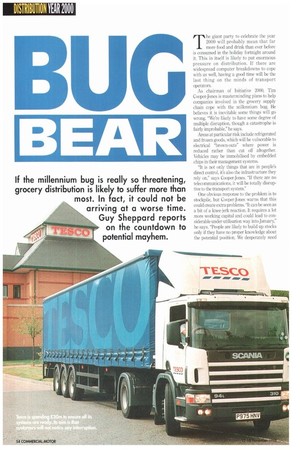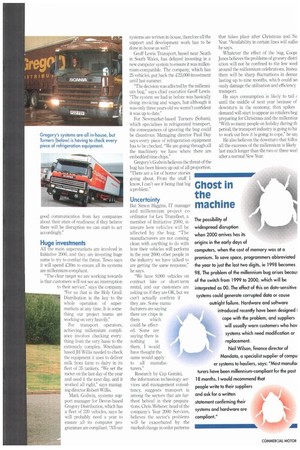If the millennium bug is really so threatening, grocery distribution
Page 56

Page 57

If you've noticed an error in this article please click here to report it so we can fix it.
is likely to suffer more than most. In tact, it could not be arriving at a worse time. ,Guy Sheppard reports on the countdown to potential mayhem.
The giant party to celebrate the year 2000 will probably mean that far more food and drink than ever before is consumed in the holiday fortnight around it. This in itself is likely to put enormous pressure on distribution. If there are widespread computer breakdowns to cope with as well, having a good time will be the last thing on the minds of transport operators.
As chairman of Initiative 2000, Tim Cooper-Jones is masterminding plans to help companies involved in the gmcery supply chain cope with the millennium bug. He believes it is inevitable some things will go wrong. "We're likely to have some degree of multiple disruption, though a catastrophe is fairly improbable," he says.
Areas at particular risk include refrigerated and frozen goods, which will be vulnerable to electrical "brown-outs" where power is reduced rather than cut off altogether. Vehicles may be immobilised by embedded chips in their management systems.
"It is not only things that are in people's direct control, it's also the infrastructure they rely on." says Cooper-Jones. "If there are no telecommunications, it will be totally disruptive to the transport system."
One obvious response to the problem is to stockpile, but Cooper-Jones warns that this could create extra problems. "It can be seen as a bit of a knee-jerk reaction. It requires a lot more working capital and could lead to considerable under-utilisation way into January," he says. "People are likely to build up stocks only if they have no proper knowledge about the potential position. We desperately need good communication from key companies about their state of readiness; if they believe there will be disruption we can start to act accordingly."
Huge investments
All the main supermarkets are involved in Initiative 2000, and they are investing huge sums to try to combat the threat. Tesco says it will spend £30m to ensure all its systems are millennium-compliant.
"The clear target we are working towards is that customers will not see an interruption to their service," says the company. "For us that is the Holy Grail. Distribution is the key to the whole operation of supermarkets at any time. It is something our project teams are working on very heavily."
For transport operators. achieving millennium compliance involves checking everything from the very basic to the extremely complex. Wrexhambased PI Willis needed to check the equipment it uses to deliver milk from farm to dairy in its fleet of 35 tankers. "We set the meter on the last day of the year and used it the next day, and it worked all right," says managing director Robert Willis.
Mark Godwin, systems support manager for Devon-based Gregory Distribution, which has a fleet of 320 vehicles, says he will probably need a year to ensure all its computer programmes are compliant. "All our systems are written in-house, therefore all the support and development work has to be done in-house as well."
Geoff Lewis Transport, based near Neath in South Wales, has delayed investing in a new computer system to ensure it was millennium-compatible. The company, which has 25 vehicles, put back the £23,000 investment until last summer, "The decision was affected by the millennium bug," says chief executive Geoff Lewis. "The system we had in before was basically doing invoicing and wages, hut although it was only three years old we weren't confident it was up to date."
For Newmarket-based Turners (Soham), which specialises in refrigerated transport, the consequences of ignoring the hug could be disastrous. Managing director Paul Day says every piece of refrigeration equipment has to be checked. "We are going through all the machinery we have where there are embedded time chips."
Uncertainty
But Simon Higgins, IT manager and millennium project coordinator for Lex Transfieet, a member of initiative 2000, is unsure how vehicles will be affected by the bug. "The manufacturers are not coming clean with anything to do with how their vehicles will perform in the year 2000; other people in the industry we have talked to are getting the same response," he says.
"We have 9,000 vehicles on contract hire or short-terra rental, and our customers are asking us if they are t )K, but we can't actually confirm if they are. Some manufacturers are saying there are chips in them which could be affected. Some are saying there is nothing in them. I would have thought the same would apply to all manufachirers."
Research by Cap Gemini, the information technology services and management consultancy, suggests transport is among the sectors that are furthest behind in their prepara tions. Chris Webster, head of the company's Year 2000 Services, believes the sector's problems will be exacerbated by the marked change in order patterns that takes place after Christmas and Ne Year. "Availability in certain lines will suffei he says.
Whatever the effect of the bug, Coope Jones believes the problems of grocery distri ution will not be confined to the few wedl around the millennium celebrations. Instea there will be sharp fluctuations in demar lasting up to nine months, which could sei ously damage the utilisation and efficiency transport.
He says consumption is likely to tail until the middle of next year because of downturn in the economy, then spikes demand will start to appear as retailers beg preparing for Christmas and the millenniut "With so many people on holiday during th period, the transport industry is going to ha' to work out how it is going to cope," he sa).
He also believes the downturn that follm; all the excesses of the millennium is likely last much longer than the two or three weel after a normal New Year.
Ghost in the machine
The possibility of widespread disruption when 2000 arrives has its origins in the early days of computers, when the cost of memory was at a premium. To save space, programmers abbreviated the year to just the last two digits, ie 1998 becomes 98. The problem of the millennium bug arises becauf. of the switch from 1999 to 2000, which will be interpreted as 00. The effect of this on date-sensitive systems could generate corrupted data or cause outright failure. Hardware and software introduced recently have been designed cope with the problem, and suppliers will usually warn customers who hay systems which need modification or replacement.
Neil Wilson, finance director of Mandata, a specialist supplier of compu er systems to hauliers, says: "Most manufa( turers have been millennium-compliant for the past 18 months. I would recommend that
people write to their suppliers and ask for a written statement confirming their systems and hardware are compliant."




















































































































